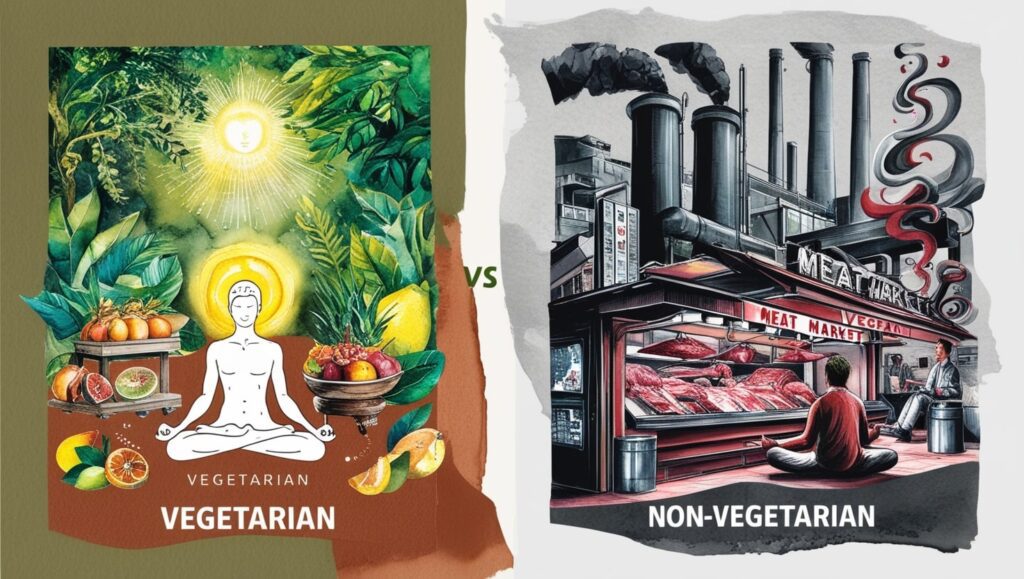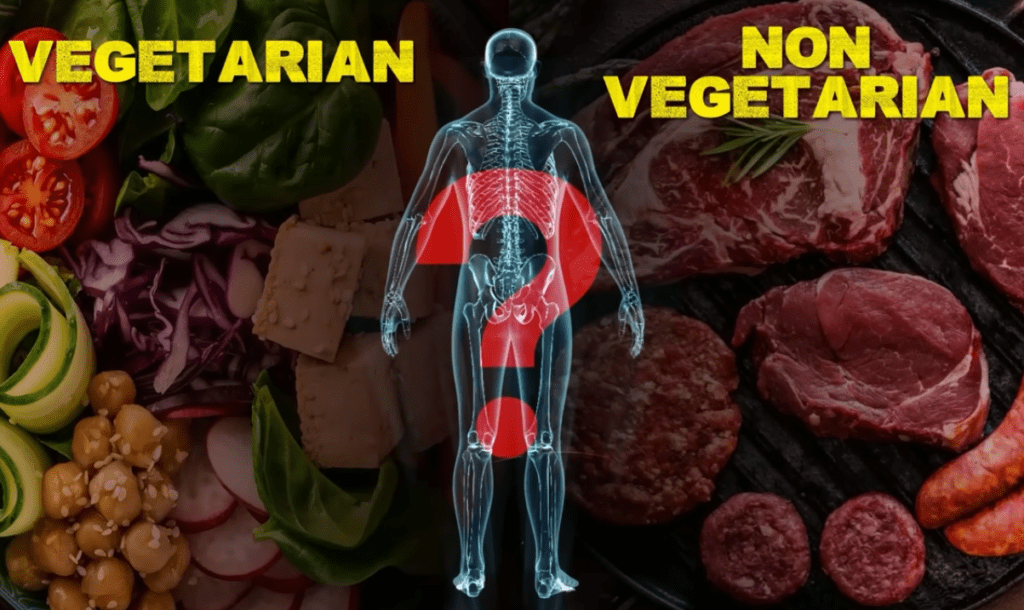

Veg vs Non-Veg which is better?
The debate over whether a vegetarian or non-vegetarian diet is superior for human health, strength, and longevity has persisted for years. People and experts on both sides present compelling arguments, citing personal experiences and scientific studies. This article aims to explore the historical, evolutionary, and scientific perspectives on the subject to understand which diet might be better suited for humans.
Historical and Evolutionary Background


Humans have evolved significantly over millions of years, with diet playing a crucial role in this evolution. Our earliest ancestors, primates like the purgatorius, primarily consumed fruits. This diet contributed to the development of sweet taste receptors, allowing us to enjoy fruits’ natural sweetness. Over time, these ancestors began to diversify their diet to include seeds, nuts, and roots, leading to changes in their digestive system.
Approximately 2.5 million years ago, significant climatic changes forced some human ancestors to adapt to a new diet that included meat. This adaptation was crucial for their survival and evolution. The consumption of high-protein meat diets facilitated brain development, enabling early humans to evolve into Homo sapiens with advanced cognitive abilities.
The Vegetarian Diet: Strengths and Benefits
1. Endurance and Stamina:
Vegetarian diets are often rich in carbohydrates, which provide sustained energy and improve endurance. Notable athletes, such as American ultra-marathoner Scott Jurek, attribute their success to plant-based diets. Vegetarian diets help retain hydration due to high carbohydrate content, making them suitable for long-distance runners.
2. Heart Health and Longevity:
Studies indicate that vegetarians have a lower risk of heart disease compared to non-vegetarians. The high fiber, antioxidants, and phytonutrients in plant-based diets help reduce cholesterol levels and inflammation, contributing to better heart health. Vegetarians also tend to consume fewer saturated fats, further lowering their risk of cardiovascular diseases.
3. Reduced Cancer Risk:
Plant-based diets are associated with a lower risk of certain cancers, particularly colorectal cancer. This is partly because plant foods contain fewer carcinogenic compounds compared to red and processed meats, which have been linked to increased cancer risk due to the formation of harmful compounds during cooking.
The Non-Vegetarian Diet: Strengths and Benefits
1. Muscle Growth and Strength:
Animal-derived proteins, such as whey, are considered superior for muscle growth and repair due to their complete amino acid profile. Studies show that meat-eaters have an advantage in maintaining muscle mass, making animal proteins beneficial for strength and bodybuilding.
2. Cognitive Function:
The consumption of meat has been linked to brain development and cognitive function. Meat provides essential nutrients like vitamin B12, which is crucial for neurological health. Vitamin B12 deficiency, common in strict vegetarians, can lead to cognitive impairments and psychiatric disorders.
3. Balanced Nutrition:
A non-vegetarian diet can offer a more balanced intake of essential nutrients, including complete proteins, iron, zinc, and omega-3 fatty acids. These nutrients are vital for various bodily functions, including immune response, muscle function, and overall health.


The Drawbacks and Risks
Vegetarian Diet:
While vegetarian diets have numerous benefits, they can be deficient in certain nutrients such as vitamin B12, iron, calcium, and omega-3 fatty acids. These deficiencies can lead to health issues like anemia, weakened bones, and cognitive impairments if not managed through supplements or careful dietary planning.
Non-Vegetarian Diet:
Non-vegetarian diets, particularly those high in red and processed meats, are associated with increased risks of heart disease, cancer, and other chronic conditions. The consumption of high amounts of saturated fats and the presence of carcinogenic compounds formed during meat cooking contribute to these risks. Additionally, non-vegetarian diets can lead to dehydration and stress due to the high protein content.
Conclusion: Finding a Balanced Approach
Both vegetarian and non-vegetarian diets have their strengths and weaknesses. Historically, humans have adapted to consume both plant and animal foods, and our bodies are equipped to digest and benefit from a balanced intake of both.
For Strength and Muscle Growth:
A diet that includes animal proteins can be advantageous due to the complete amino acid profile and the superior muscle repair and growth benefits. However, vegetarians can achieve similar results with careful planning and a combination of various plant-based protein sources.
For Endurance and Stamina:
Vegetarian diets tend to provide better endurance and hydration, making them suitable for athletes engaged in long-distance activities.
For Cognitive Health:
Non-vegetarian diets provide essential nutrients like vitamin B12 that are crucial for cognitive function and brain health. Vegetarians should ensure they get these nutrients through fortified foods or supplements.
For Longevity and Disease Prevention:
Vegetarian diets are generally better for heart health and cancer prevention. Non-vegetarians should minimize red meat consumption and opt for lean meats like chicken and fish to mitigate health risks.
In summary, the best diet for health, strength, and longevity is one that is balanced and tailored to individual nutritional needs. Whether you choose a vegetarian or non-vegetarian diet, it is essential to ensure you receive all the necessary nutrients for optimal health. Moderation and careful planning are key to achieving a healthy and sustainable diet.
Read our latest articles: https://genzfitness.in/
Free stock market course for Genz– https://genzfitness.in/free-stock-market-course-for-genz-4-formulas/
Best Invest App – Groww





